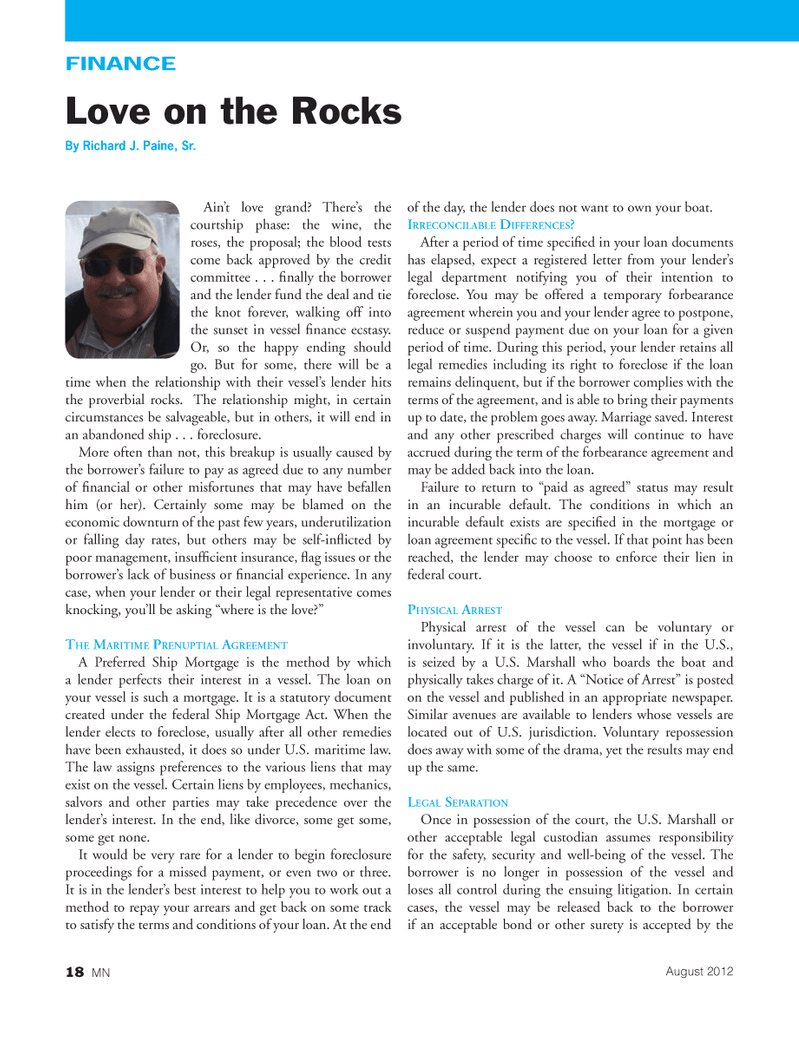
Page 18: of Marine News Magazine (August 2012)
Salvage & Recovery
Read this page in Pdf, Flash or Html5 edition of August 2012 Marine News Magazine
FINANCEAin?t love grand? There?s the courtship phase: the wine, the roses, the proposal; the blood tests come back approved by the credit committee . . . nally the borrower and the lender fund the deal and tie the knot forever, walking off into the sunset in vessel nance ecstasy. Or, so the happy ending should go. But for some, there will be a time when the relationship with their vessel?s lender hits the proverbial rocks. The relationship might, in certain circumstances be salvageable, but in others, it will end in an abandoned ship . . . foreclosure. More often than not, this breakup is usually caused by the borrower?s failure to pay as agreed due to any number of nancial or other misfortunes that may have befallen him (or her). Certainly some may be blamed on the economic downturn of the past few years, underutilization or falling day rates, but others may be self-in icted by poor management, insuf cient insurance, ag issues or the borrower?s lack of business or nancial experience. In any case, when your lender or their legal representative comes knocking, you?ll be asking ?where is the love?? THE MARITIME PRENUPTIAL AGREEMENTA Preferred Ship Mortgage is the method by which a lender perfects their interest in a vessel. The loan on your vessel is such a mortgage. It is a statutory document created under the federal Ship Mortgage Act. When the lender elects to foreclose, usually after all other remedies have been exhausted, it does so under U.S. maritime law. The law assigns preferences to the various liens that may exist on the vessel. Certain liens by employees, mechanics, salvors and other parties may take precedence over the lender?s interest. In the end, like divorce, some get some, some get none.It would be very rare for a lender to begin foreclosure proceedings for a missed payment, or even two or three. It is in the lender?s best interest to help you to work out a method to repay your arrears and get back on some track to satisfy the terms and conditions of your loan. At the end of the day, the lender does not want to own your boat. IRRECONCILABLE DIFFERENCES?After a period of time speci ed in your loan documents has elapsed, expect a registered letter from your lender?s legal department notifying you of their intention to foreclose. You may be offered a temporary forbearance agreement wherein you and your lender agree to postpone, reduce or suspend payment due on your loan for a given period of time. During this period, your lender retains all legal remedies including its right to foreclose if the loan remains delinquent, but if the borrower complies with the terms of the agreement, and is able to bring their payments up to date, the problem goes away. Marriage saved. Interest and any other prescribed charges will continue to have accrued during the term of the forbearance agreement and may be added back into the loan.Failure to return to ?paid as agreed? status may result in an incurable default. The conditions in which an incurable default exists are speci ed in the mortgage or loan agreement speci c to the vessel. If that point has been reached, the lender may choose to enforce their lien in federal court. PHYSICAL ARRESTPhysical arrest of the vessel can be voluntary or involuntary. If it is the latter, the vessel if in the U.S., is seized by a U.S. Marshall who boards the boat and physically takes charge of it. A ?Notice of Arrest? is posted on the vessel and published in an appropriate newspaper. Similar avenues are available to lenders whose vessels are located out of U.S. jurisdiction. Voluntary repossession does away with some of the drama, yet the results may end up the same.LEGAL SEPARATION Once in possession of the court, the U.S. Marshall or other acceptable legal custodian assumes responsibility for the safety, security and well-being of the vessel. The borrower is no longer in possession of the vessel and loses all control during the ensuing litigation. In certain cases, the vessel may be released back to the borrower if an acceptable bond or other surety is accepted by the Love on the RocksBy Richard J. Paine, Sr. 18 MNAugust 2012

 17
17

 19
19
